Introduction: In this article, Gena Philibert-Ortega writes about doing family history research using small-town newspapers – finding details about your ancestors’ lives that you can’t find in any other source. Gena is a genealogist and author of the book “From the Family Kitchen.”
Are you from a small town? Maybe you aren’t – but perhaps your ancestor was. Small-town newspapers are some of the greatest genealogy sources around because they, unlike big city newspapers, are more likely to document your ancestors’ everyday lives.
Big city newspapers tend to focus more on national and international stories. While they may have occasional mentions of an ancestor, you’re more likely to find articles about them in small town newspapers, as well as reports on the day-to-day happenings of their community.
What can small-town newspapers add to your family history research? In addition to the types of articles you’d find in a big city newspaper (birth notices, wedding announcements, obituaries, legal notices, etc.), there’s a better chance your ancestors are mentioned in small-town papers with details about their lives that are not found in any other source.
The Personal Touch
A big difference between small-town newspapers and their large city counterparts is the probability that your ancestor is mentioned, no matter who they are. They didn’t have to accomplish some great feat (or commit an indiscretion) to appear in their community newspaper.
In some cases, just going to church or visiting a friend was enough to garner a mention in a local news section. Consider this page of the Marietta Journal that reports on the lives of those living in the region.
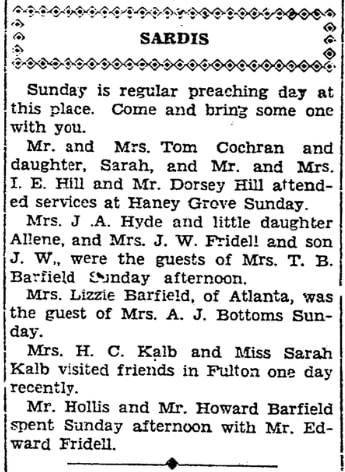
A family historian has to love this type of newspaper article, with its mentions of local residents, events that were important to them, and even names of family and friends visiting from out of town. These types of articles not only provide you with information about what your ancestor was doing, they might also give you clues to other related families, their hometowns, and more.
One of the most helpful types of small-town articles are reports on the illness of an ancestor shortly before their death. This allows you to follow their last days and, in some cases, even follow the activities after the death – such as the names of those who traveled to town for the funeral.
Some “local news” articles may not seem like “real news,” but they’re great to find when they’re about your ancestor. I have to admit I’d love to find a mention of my ancestor like this one from the St. Johns Herald: “Charles Kinnear, the old-timer, is in town making everybody cheerful about him.”
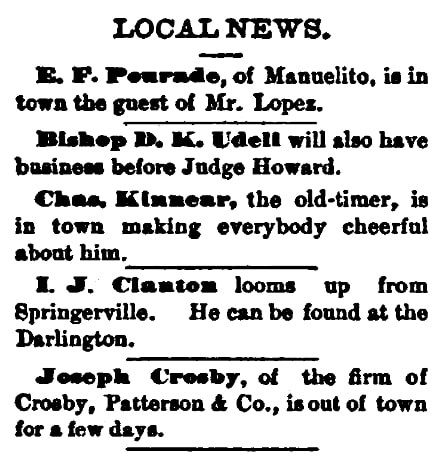
Don’t Forget the Children
I’ve mentioned before that my son has asked why I don’t write more about tracing the children in our family trees. One reason we tend to skip over researching the younger members of the family is that they don’t leave much of a paper trail – but that isn’t always true if we are searching small-town newspapers. All kinds of school, extracurricular, church, and other activities involving kids are documented in local papers.
Don’t forget about the child-centered organizations your ancestor may have been a member of, such as Scouting. Newspaper articles like this one from the Emporia Gazette might list boys or girls who participate in local groups, or at least report on events that they participated in.
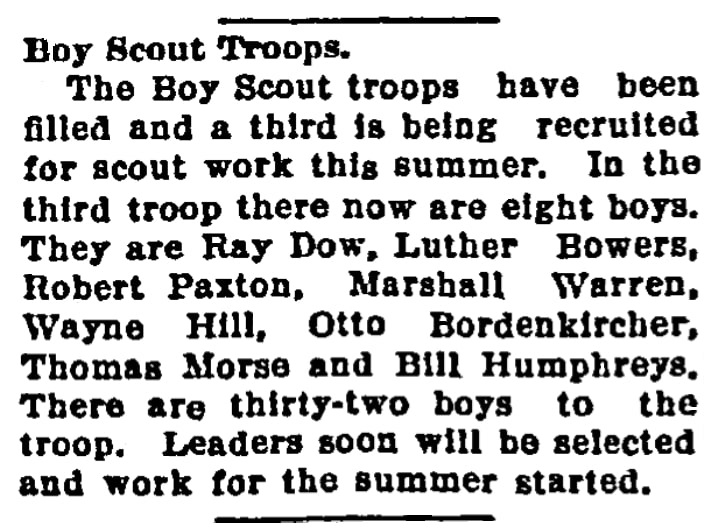
I love this column in the Liberal Democrat newspaper that provides updates on the local Girl Scout troop. A regular column like this can be a wonderful find for the researcher.
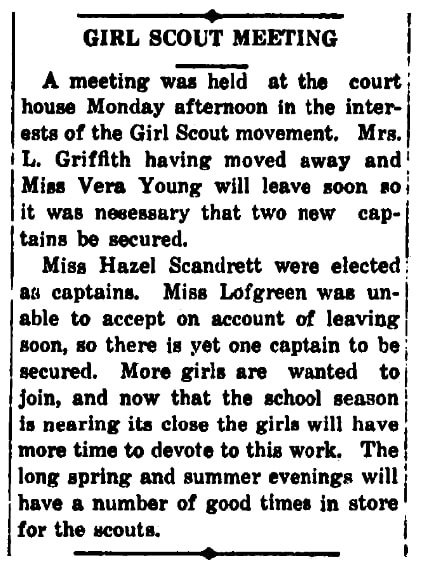
Remember that, in some cases, newspaper articles can be about activities your ancestor was involved in but not individually named. Once you discover their membership in a group, try searching for that group during the time period they would have been a member to get a sense of what they may have been involved in.
And of course, just like their adult counterparts, our child ancestors were also written about when they were bad, like this example from the Anaconda Standard that involves some “bad boys” who had caused a teacher to close her school because of their disturbances.
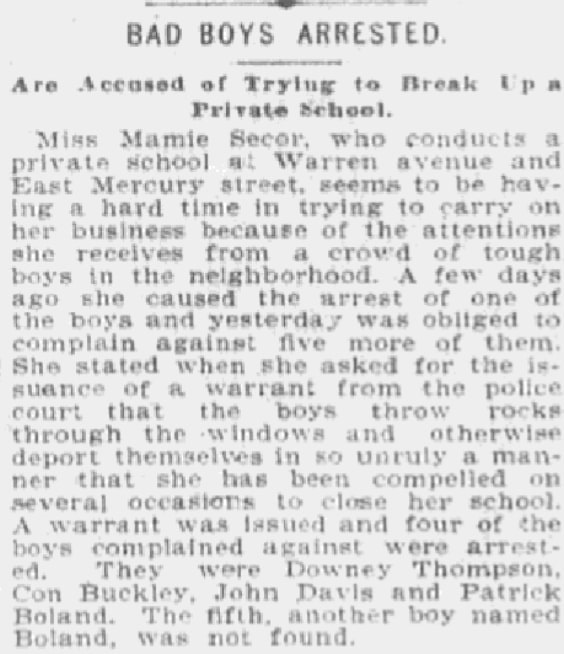
Small-town newspapers report all aspects of community life, some of which might surprise descendants.
Their Community Life
Small-town newspapers also give you a greater chance of finding something like an ancestor’s business advertisement. If your ancestor had a business, make sure to pay special attention to advertisements and classified ads that might give you some clues about their lives.
This advertisement in the Argus for William Armbruster, “Practical Blacksmith and Wheelwright,” provides information about where his shop was located and his business mission. A great find for a descendant.
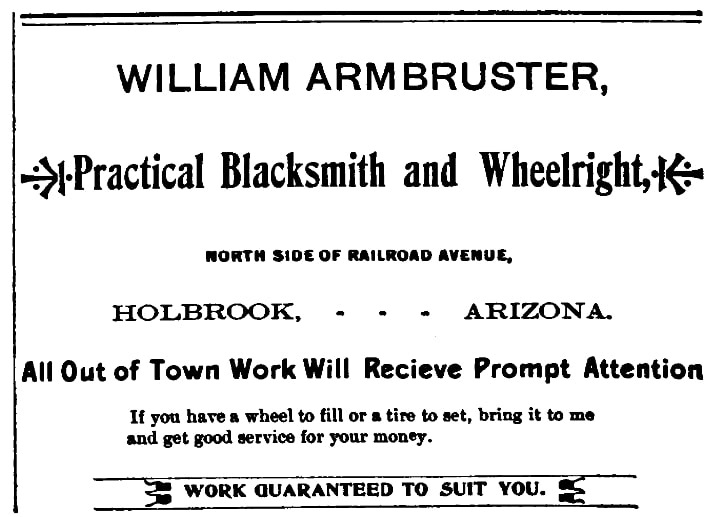
Tucked in with the advertisements on this page of the St. Johns Herald was this great column of cattle brands that include the name of the owner, description of the brand, and an illustration with the placement of the brand on the animal. It’s small details like these, that were important to the community, that you find by studying a small-town newspaper.
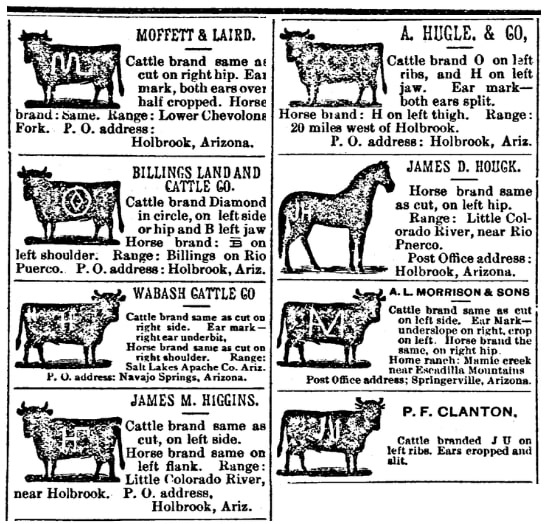
Look for Your Ancestors’ Hometown Newspapers in GenealogyBank
Do you know how to find the small-town newspapers you’re looking for in GenealogyBank? You can find them by going to our website and selecting Browse Newspapers by State.
This will reveal a list of all 50 states, plus the District of Columbia, Guam, Puerto Rico, and a collection of national newspapers. Choose any location on this list, and that state/territory’s newspapers (and their years of coverage) are shown. You can then select the newspaper(s) you want to search. But remember: these lists are constantly being added to, so make sure to check back often.
Small-town newspapers reported on what was important to your ancestors’ communities, including “personal” news such as events and the comings and goings of their neighbors. Do yourself a favor and learn more about their lives by studying their small-town newspapers.

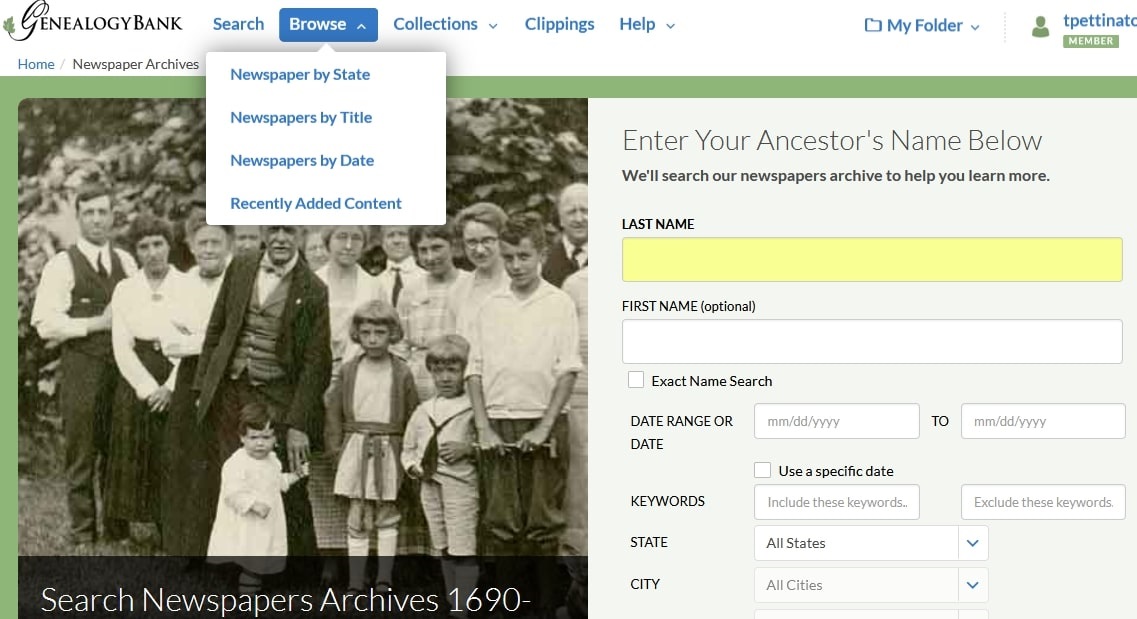
This is an excellent article — and I make my comments as the former owner of three small-town newspapers. Unfortunately, not all small-town newspapers have had their archives digitized. In those cases, check with libraries within that county to see if the newspaper archives are on microfilm. Failing that, call the newspaper (if it still exists) to see if it has “bound volumes” of the years you need. If so, ask if you can make an appointment to look at them. Please don’t show up without an appointment, and please don’t assume that a small newspaper has someone who can do the research for you.
Small-town newspapers are great, but I live in a rural county in south central IL and although some of the local newspapers (two) have been put on microfilm and are at the library, due to the pandemic, the library is currently closed and has been for 10 months. I have asked newspapers.com if they ever plan to include our county newspapers in their files and basically told no. How does one go about finding local papers without hours and hours of searching microfilm when the library reopens? There are no name indexes for these records. I belong to the local genealogy and historical society but they are greatly limited even when the library is open, as all assistance comes from volunteers. There are 14 townships within the county but I am not sure at this time how many newspapers. Mainly I am interested in only two but there may have been more in the past. I am disabled and do most of my research from home by computer. How can people like me get newspapers from our local region put onto the internet or the library’s internet files?
I have been using small-town newspapers for several years. Yes, it is often necessary to go through the microfilm of the paper page by page. However, if you have dates of significance such as death dates, residency dates, marriage dates, or names of small villages in the area, go armed with your list of dates and names. Go directly to the newspaper dates on the film where you will likely find some mention or coverage of the person, family, or topic you are researching. Yes, it can be time-consuming, but is worthwhile. Unfortunately, researching these newspapers requires being on-site. Considering that newspapers were the media of choice and of the day during the 19th and 20th centuries, small cities often supported more than one newspaper. Small towns often published a weekly newspaper. They truly are gems for genealogical research.